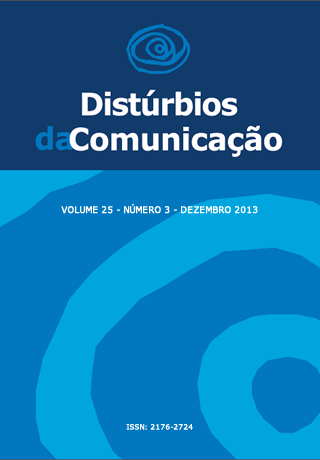Voice characterization of hypertensive individuals
Keywords:
voice, hypertension, voice disorders, quality of lifeAbstract
Purpose: To characterize the voice of the hypertensive individual considering vocal and laryngeal symptoms, perform a perceptive-auditory evaluation and vocal self-assessment. Methods: 38 hypertensive individuals from 46 to 82 years of age (average 68,5) linked to the HIPERDIA program responded a questionnaire about the history of the disease, symptoms and the voice related quality of live (V-RQOL) protocol. A perceptive-auditory evaluation was performed and the voices were analyzed by specialized speech-language pathologists. Results: The most referred symptoms were dry mouth (n=26; 68,4%), cough (n=22; 57,9%) and sensation of foreign body in the larynx (n=20; 52,6%). The average of symptoms was 3,4. Most individuals presented altered voices (n=82, 75,9%), with statistically significant different in relation to those who presented adapted voices (p= <0,001). From the altered voices, 46,3% were hoarse and 46,3% were breathy. The overall average of the V-RQOL was 78,88 in total, 76,67 in the socialemotional domain and 80,2 in the functioning domain. There was no statistically significant difference regarding the variable age with the others (kind of symptoms, quality of voice and V-RQOL scores). Conclusion: Hypertensive individuals present considerate average of symptoms. The most reported were dry mouth, cough and sensation of foreign body in the larynx. They present altered voices, predominantly hoarse. The dysphonia causes significant impact on hypertensive individual’s lives.Downloads
Download data is not yet available.
Metrics
Metrics Loading ...
Downloads
Published
2013-12-27
Issue
Section
Artigos
License
Copyright (c) 2013 Larissa Mendes, Juliana Marcolino, Michelly Andrade, Ana Paula Dassie-Leite

This work is licensed under a Creative Commons Attribution 4.0 International License.









